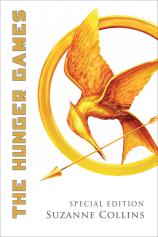The Hunger Games
Review
The Hunger Games
In my Teenreads.com review of THE SILENCED by James DeVita, I noted that we have a love of dystopian novels. I think it's because we, as humans, like to be right. We like to be able to make correlations between the conditions we see in the world and possible scenarios about how those conditions could achieve Worse Case Scenario status. It's frightening, really, that we should want to be right about that. Maybe it could be that we're glad other people (authors) seem to share our concerns about our direction --- as a civilization, as a country.
I admit: I'm a sucker for a good dystopian novel. In my mind, a GOOD dystopian novel doesn't settle for simply presenting a bleak set of circumstances and warning, "This is what could happen if we don't change our ways." A GOOD dystopian novel forces us to become emotionally invested in the people who are affected by the bleak conditions. A GREAT dystopian novel goes a step further and makes us want more. THE HUNGER GAMES by Suzanne Collins, author of the Gregor the Overlander series, falls into this category.
The story is set in Panem, part of what used to be North America until an epic disaster rent civilization asunder into a chaotic tailspin. Rising from the ashes is the Capitol, a nightmarish totalitarian state, and 12 Districts kept under the painful thumb of the central Capitol government. The Capitol rules ferociously after an attempt at uprising several years earlier that resulted in the obliteration of a 13th District. To keep the remaining districts in line, the Capitol devised "The Hunger Games," a brutal competition for which each district must supply two "players" (known as tributes) between the ages of 12 and 18. The 24 tributes fight to the last person standing in a wasteland-like arena where they compete for basic survival supplies while every moment is mandatory televised viewing for all citizens.
When her younger sister is randomly chosen to represent their district, Katniss Everdeen volunteers to take her place. She is sent to the Capitol with her district's other tribute, a baker's son named Peeta, where they are forced to participate in a macabre pageantry (complete with make-up artists and celebrity interviews) that leads up to the deadly games themselves. Once she enters the arena, Katniss must face her murderous fellow-tributes (some have been training for years in the event they were chosen) and decide if Peeta is an ally or an enemy. However, the decision seems to be a moot point because, as the rules stand, only one of them can emerge alive from the arena.
Collins's dystopia is somewhat old-fashioned --- mass, seemingly uncalculated oppression --- compared to more recent entries, such as LITTLE BROTHER, which is firmly grounded in a more clearly attainable reality. But I think the old-fashioned approach is part of the charm of this book (if, indeed, you can attribute the word “charm” to something that offers such a grim outlook). Collins crafts a vivid, frightening world where the citizens are worked to the point of exhaustion, starved to the point of collapse, and humiliated beyond the tolerance of any sane person for the entertainment of the elite. The heart of the book is the characters. Katniss is brave and caring, Peeta is smart and smitten. Anyone can scare readers by presenting a future devoid of hope, but it takes a skilled writer to create characters we dare to hope for. Collins has accomplished just that.
You'll be hearing a lot about THE HUNGER GAMES in the weeks and months to come, if you haven’t already. There's good reason for that. If you're like me, you have an unrelenting pile of "to be read" books. Take my advice: nudge this one closer to the top.
Reviewed by Brian Farrey on September 14, 2008
The Hunger Games
- Publication Date: October 30, 2018
- Genres: Fantasy, Science Fiction, Young Adult 13+
- Paperback: 440 pages
- Publisher: Scholastic Inc.
- ISBN-10: 1338321919
- ISBN-13: 9781338321913










